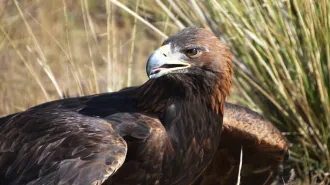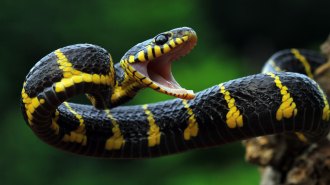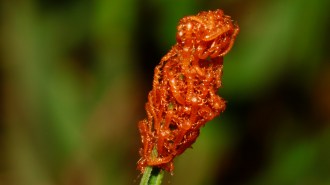A new study of wild guppies could unsettle a decades-old idea about the role of danger in the evolution of aging.

Biologists in the 1950s predicted that in a treacherous habitat, creatures would evolve so that they’d age rapidly, explains David N. Reznick of the University of California, Riverside. However, when he and his colleagues compared guppies from streams with many predators with streams posing few threats, the prediction failed. In the absence of predators, the guppy lineages from the menacing steams didn’t tend to die early, he and his colleagues report in the Oct. 28 Nature. “The classical theory is incomplete,” says Reznick.
“It’s the first test with species that evolved under natural conditions,” says senescence researcher Marc Tatar of Brown University in Providence, R.I. He praises the new guppy project as “a Herculean effort.”
The idea of linking danger and fast aging goes back decades to such theorists as medical Nobelist Peter Medawar. He proposed in 1952 that in dangerous places, early deaths keep natural selection from purging mutations that are harmful later in life.
As another explanation, evolutionary biologist George C. Williams suggested that danger favors early reproduction, which would sap resources that otherwise might have been available for later life.
A variety of studies in several species of animals, including fruit flies, linked early mortality to evolution in the presence of dangers.
Reznick and his various collaborators have been analyzing Trinidad’s wild guppies for some 20 years. Cichlids, tetras, and other predatory fish abound in the lowland stretches of watersheds, but waterfalls prevent most predators from invading upstream waters. Earlier work by Reznick’s team found that guppies in the more menacing locales did indeed tend to start reproducing early.
To test for effects on aging, Reznick and his colleagues raised the offspring of guppies from high- and low-predator waters in the laboratory for two generations. This extended period eliminated lingering effects of such nongenetic factors as food supply in the wild.
The guppies in lineages from the dangerous places didn’t tend to stop reproducing earlier or to die sooner than those in lineages from safe havens did, the researchers found.
One sign of early aging did appear. In tests of guppy responses to a golf ball plunked against the aquariums, the high-danger lineages lost their swimming edge faster with age than the low-danger lineages did.
A few theorists, including Peter Abrams of the University of Toronto, had contended that the early view of aging was too simple. Until now, work such as Abrams’ has largely been ignored, says Tatar. He predicts that the mixed results of Reznick’s work will encourage theorists to consider more-complex models.







